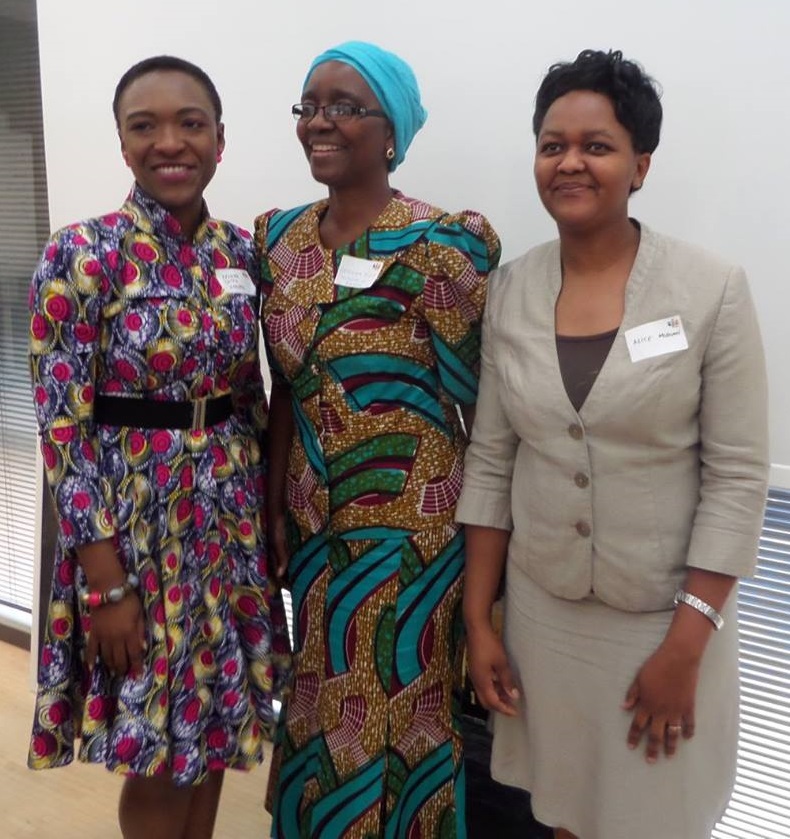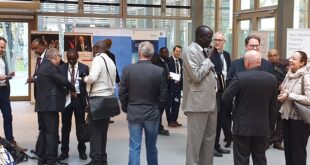“Agenda 2030: Sustainable Development Goals” was the theme of this year’s Africa Day in the western German city of Dortmund.
The 3-day congress, which marked the founding of the Organisation of African Unity (now African Union) in 1963 and was organised by the non-governmental organization AfricanTide Union, beamed the focus on Agenda 2030 and its relevance to tackling the knotty problems of extreme poverty and inadequate economic growth in Africa.
The UN General Assembly adopted the Agenda 2030, consisting of 17 goals “to end poverty, protect the planet, and ensure prosperity for all” as part of a new sustainable development agenda on 25 September 2015. Each goal of the Agenda, the successor of the Millennium Development Goals (MDGs), has specific targets to be achieved until 2030.
Zimbabwe’s ambassador to Germany, HE Ruth Masodzi Chikwira, delivered the keynote speech on the Sustainable Development Goals (SDGs) and how they could form part of an overall strategy to support Africa’s quest to reduce poverty, protect the environment and fight inequality.
While the MDGs programme was for the lesser developed countries, SDGs require the participation of all countries and all sectors – governments, the private sector, civil society and citizens – for the realization of the blueprint’s objectives.
Mrs Chikwira said the implementation of the MDGs – which range from halving extreme poverty rates to halting the spread of HIV/AIDS and providing universal primary education, all by the target date of 2015, was a success as it lifted more than 1 billion out of poverty worldwide. Despite that achievement, inequality is still rife while infant mortality, maternal mortality and other symptoms of underdevelopment still remained. This was why the global community initiated the 17 SDGs to build on the successes of the MDGs, while including new areas such as climate change, economic inequality, innovation, sustainable consumption, peace and justice, among other priorities.

The ambassador explained that a major emphasis of the SDGs is on sustainability which means the use of resources in such a way that the coming generations would not be short-changed. She challenged the audience of diplomats, activists, journalists, Diaspora Africans and German officials at the event to become active participants in the efforts to realize the SDGs.
She spoke on how sustainable behaviour on an individual level wherever we may live does contribute to the promotion of the SDGs. The individual actions that promote the sustainable use of resources include:
- Unplugging appliances when not in use to save energy
- freezing food instead of allowing them to go bad and having to throw them away
- Smart shopping: buying what is necessary at a time to avoid wastage due to spoiling
- Not printing email messages when not necessary
- Not wasting water
- Drying clothes on laundry lines where and when the weather allows it
- Eating less meat and fish as their production affects the environment negatively
Ambassador Chikwira called for the relaxation of specifications of food import into the EU as some of the rules promote wastage. She cited the example of bananas which have to be of a particular length and anything short of the prescribed size is rejected. Such rules cause the wastage of perhaps millions of agricultural produce worldwide, she pointed out.
Mrs Chikwira also called for increased global efforts to stop the pollution of oceans which leads to the destruction of fish stocks thereby threatening food security and destroying the livelihoods of millions of people worldwide.
The envoy talked at length about the dependence of Africa on imported food to the tune of 40 billion dollars annually. She blamed the policies of Western nations for being partly responsible for the situation. Mrs Chikwira said subsidies paid to farmers in the EU negatively impact agriculture in Africa, challenging the Union to stop subsidizing their farmers and channel the resources to support development elsewhere in the world.
In view of demographic projections which indicate that three-quarters of global population growth will take place in Africa in the next fifty years, the ambassador said the continent must make increased efforts to feed itself. Apart from ensuring food security, the development of agriculture would also transform socio-economic structure of African countries. She pointed out that agricultural growth will reduce poverty and inequality, improve balance of payment and help ginger the development of processing industries.
A more active civil society was also important to the realisation of the SDGs, she pointed out. “Let’s speak out to our leaders on issues affecting us,” she advised in the conclusion of her speech.

In a contribution on behalf of Guinea’s ambassador to Germany, HE Touré Fatoumata Balde, an official of the country’s mission in Berlin said the SDGs could achieve its aims in Africa only if the West treated Africans as partners. Nelli Foumba Soumaoro called on African countries to design their own programmes instead of relying on those from the outside to solve poverty in the continent.
“All global anti-poverty goals are set by the West without the participation of those directly affected, Mr Soumaoro said. “We have to take our fate into our own hands and not always rely on outsiders to solve our problems.”
Soumaoro pitched for investment in his mineral-rich country at the event. He cited bauxite, iron ore, nickel, gold and diamond as some of the mineral resources in the West African country of about 10.7 million people. He announced that the government of President Alpha Condé was welcoming of foreign investment and offers numerous incentives to make doing business in the country attractive.
In a short but very thought-provoking presentation, Sergie Palesie of Eine Welt Netz (One World Network) of the state of North Rhine-Westphalia displayed an Iberian drawing of 1375 on which Mali’s ruler Mansa Musa was described as the world’s richest person. He pointed out that Africa was never a poor continent and it still abounds in human and natural resources.
Mr Palesie did an historical review of the African-Western relations and how these still largely determined the situation of Africa today. He pointed out that political independence of the continent had not translated into economic freedom. He said growing inequality, poverty and imbalance of trade relations still characterised Africa.
The development expert said only the processing of the raw materials available in Africa in the continent before they’re exported could significantly improve its economic fortunes.
Palesie also criticised what he described as political incoherence of international development initiatives in the sense that what the SDGs are meant to achieve are negated by other pacts such as the Economic Partnership Agreements (EPAs), trade and development agreements negotiated between the EU and African, Caribbean and Pacific countries.
Dr Jones Edobor, a Switzerland-based Nigerian economist, talked about Africapitalism, a term first coined by the Nigerian banker and investor Tony Elumelu in 2010.
Edobor said Africapitalism is about African entrepreneurs driving the transformation of Africa with investments that also consider the socio-economic development of the continent.

The expert pointed out that economic growth was still too low to keep pace with demographic growth in Africa. He said the narrative of ‘Africa Rising’ touted in the West was erroneous. He said Africa’s economic growth of about 4.5 per cent in the decade up to 2015 was too low to generate employment at the level required because the growth was fuelled by increased international demand for the continent’s minerals which are extracted without much value added to them before export.
He explained that an economy begins to generate employment at a growth rate higher than 2 per cent, calling for the improvement of infrastructure to promote greater intra-African trade. Edobor also called for local value addition to raw materials in the continent before their export and he charged African leaders to come together to design a strategy of economic growth that will match projected demographic growth in the continent.
The economist also called for the merger of all regional economic blocs in Africa and a more aggressive fight against corruption, which he said hampers the development of the private sector.
The Africa Day in Dortmund, which took place on 25-27 May under the theme “Agenda 2030: Sustainable Development Goals”, was held concurrently with the Nigerians in Diaspora Organisation Europe Project Summit 2017.
Femi Awoniyi
About AfricanTide Union
AfricanTide Union e.V. was founded in 2010 to promote the integration of migrants, especially from the African continent, and to make a lasting contribution to intercultural understanding and mutual respect in Germany. The non-governmental organisation also deals with the issues of development and migration.
More about the organisation at: http://www.africantide.com
 THE AFRICAN COURIER. Reporting Africa and its Diaspora! The African Courier is an international magazine published in Germany to report on Africa and the Diaspora African experience. The first issue of the bimonthly magazine appeared on the newsstands on 15 February 1998. The African Courier is a communication forum for European-African political, economic and cultural exchanges, and a voice for Africa in Europe.
THE AFRICAN COURIER. Reporting Africa and its Diaspora! The African Courier is an international magazine published in Germany to report on Africa and the Diaspora African experience. The first issue of the bimonthly magazine appeared on the newsstands on 15 February 1998. The African Courier is a communication forum for European-African political, economic and cultural exchanges, and a voice for Africa in Europe.

























